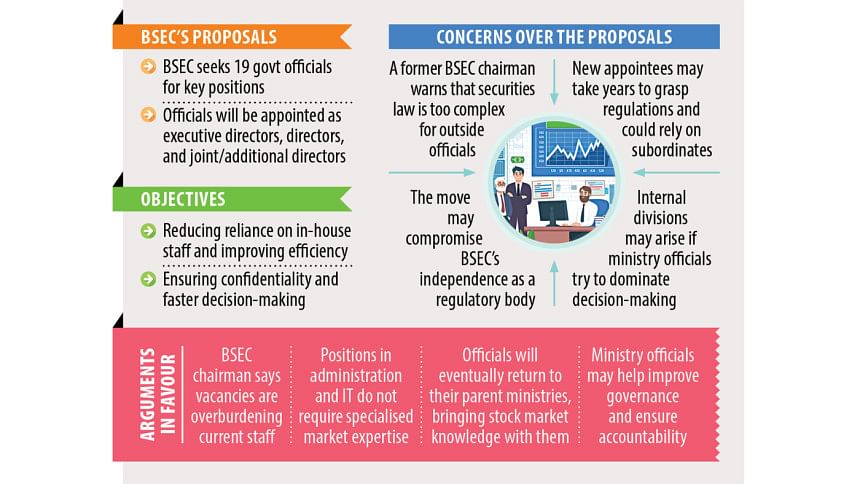Should BSEC hire govt officials?

The Bangladesh Securities and Exchange Commission (BSEC) has sent a letter to the government requesting the appointment of 19 officials with degrees in economics, finance, commerce, accounting, statistics, mathematics, law, and information technology.
Among these officials, three will be executive directors, three will be directors, one will be the commission secretary, and 12 will hold joint or additional director positions.
The BSEC's rationale for seeking these officials is to reduce complete reliance on its own staff, improve the quality of its work, speed up processes, and maintain confidentiality.
However, the request has sparked mixed opinions among BSEC officials and stakeholders. While the top leadership of the BSEC strongly justifies the need, others have raised concerns.
Faruq Ahmad Siddiqi, a former chairman of the regulatory body, stated that securities law is one of the most complex legal frameworks in the country, clarified through numerous directives and circulars.
Therefore, it is not easy for officials from different government cadres to implement the rules and regulations. They would need two to three years to understand them and might have to rely on their subordinates.
He pointed out that the BSEC is a unique, independent body with the authority to frame its own rules, setting it apart from other regulatory bodies such as the central bank and Anti-Corruption Commission.
The government cannot appoint the BSEC chairman or commissioners from its own officials on deputation. Thus, the spirit of the law does not support appointing BSEC officials from other government cadres, Siddiqi said.
"Appointing government officials may impact the independence of the BSEC, regardless of their capacity and role," he added.
A mid-level BSEC official, speaking anonymously, said that including new officials from the ministry may create divisions within the regulatory body as they might attempt to dominate others.
Moreover, they may try to remain in the BSEC for an extended period, which could create problems for existing officials seeking promotions after gaining experience within the regulatory body.
BSEC Chairman Khondoker Rashed Maqsood stated that the BSEC does not have a long history like the central bank and has a significant number of vacancies, a fact acknowledged by BSEC officials.
It is not possible to fill these vacancies overnight. Due to this shortage, the existing officials are overburdened, leading to significant delays in completing tasks.
Since the BSEC is seeking officials with backgrounds in finance, economics, and related fields, integrating them into the regulatory body should not be difficult, Maqsood said.
Moreover, not all BSEC departments require technical expertise, he added.
For instance, the administration and information technology departments do not necessarily require technical specialists, making them suitable for these new officials.
He dismissed concerns that these officials would not return to their original roles, explaining that they would have to return for career advancement and promotions.
Additionally, when these officials return to the Ministry of Finance, they will serve as advocates for the stock market.
This will help change the perception that ministry officials do not understand or take ownership of the market, Maqsood said.
"In one instance, BSEC officials intentionally changed the minutes of a commission meeting. At the very least, such tasks can be handled more properly with these officials," he added.
Saiful Islam, president of the DSE Brokers Association, said he does not support the decision to bring in officials from the ministry for operational functions, except for the commission secretary and the chairman's personal secretary.
His concern is that bringing in such officials may allow the ministry to exert influence, which would violate the fundamental spirit of the regulatory body.
The SEC is a specialised regulatory body that is not a government organ and is kept separate from the government worldwide.
It is a service-oriented, quasi-judicial body with the power to hold hearings and enforce judicial decisions, he added.
Referring to the chief adviser's statement, Islam said that all institutions had deteriorated, so capacity building and good governance should be reinstated within the system.
Islam stressed that only corrupt officials should face punishment while others should be promoted, and new recruitments should be expedited.
Even the Bangladesh Bank has never hired officials from other government bodies as it follows the principle that the officials of regulatory body require specialised training, he said.
MD Moniruzzaman, managing director and CEO of Prime Bank Securities, said that some departments do not require much technical expertise, so if the BSEC believes it is necessary, it could hire officials for those departments.
However, if the regulator hires only two or three, it will miss the opportunity to develop in-house expertise.
Currently, it can rotate its officials across different departments to enhance their skills, he said.
If new officials are appointed in technical departments, it may create problems, he added.

 For all latest news, follow The Daily Star's Google News channel.
For all latest news, follow The Daily Star's Google News channel. 



Comments